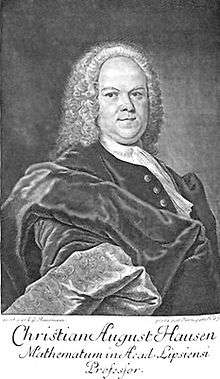Christian August Hausen
Christian August Hausen (1693–1743) was a German mathematician who is known for his research on electricity.
Christian August Hausen | |
|---|---|
 Picture of Christian August Hausen from a 1737 edition of Acta Eruditorum | |
| Born | 19 June 1693 |
| Died | 2 May 1743 (aged 49) |
| Nationality | German |
| Alma mater | University of Wittenberg |
| Scientific career | |
| Fields | Mathematics Physics |
| Institutions | University of Leipzig |
| Doctoral advisor | Johann Christoph Wichmannshausen |
| Doctoral students | Abraham Gotthelf Kästner |
Biography
Hausen studied mathematics at the University of Wittenberg and received his master's degree in 1712. He became an extraordinary professor of mathematics at the University of Leipzig at the age of 21 and later (1726) became an ordinary professor.[1]
Hausen also researched electrical phenomena, using a triboelectric generator. In the introduction to his book on this subject, Novi profectus in historia electricitatis,[2][3] published posthumously, Hausen states that he started these experiments shortly before his death. Hausen's generator was similar to earlier generators, such as that of Francis Hauksbee. It consisted of a glass globe rotated by a cord and a large wheel. An assistant rubbed the globe with his hand to produce static electricity. Hausen's book describes his generator and sets forth a theory of electricity in which electrification is a consequence of the production of vortices in a universal electrical fluid.[4]
References
- pp. 94–95, Biographies of contributors to the early investigation of electrical phenomena, Reimund Gerhard-Multhaupt, IEEE Transactions on Electrical Insulation 26 (February 1991), #1, pp. 85–130.
- Novi profectus in historia electricitatis, Christian August Hausen, Leipzig: Theodorum Schwan, 1743.
- pp. 72–73, Electricity from glass: the history of the frictional electrical machine 1600–1850, Willem Dirk Hackmann, Alphen aan den Rijn, Netherlands: Sijthoff & Noordhoff, 1978. ISBN 90-286-0308-5.
- pp. 270–272, Electricity in the 17th and 18th centuries: a study of early modern physics, J. L. Heilbron, Berkeley: University of California Press, 1979. ISBN 0-520-03478-3.